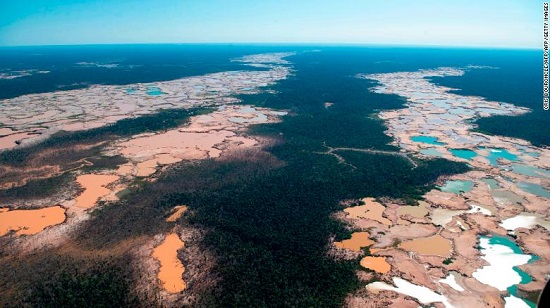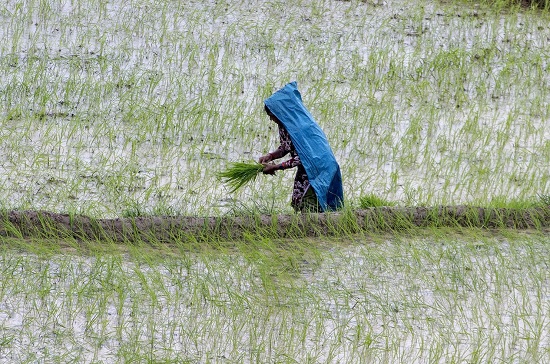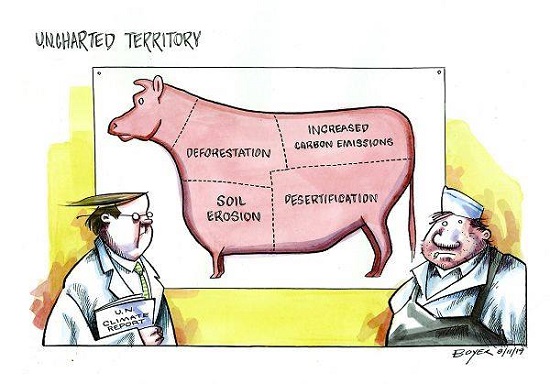2019 SkS Weekly Climate Change & Global Warming Digest #32
Posted on 11 August 2019 by John Hartz
Story of the Week...
Change food production and stop abusing land, major climate report warns

Land degradation, including deforestation, produces almost a quarter of the world's greenhouse gas emissions. Pictured: An aerial view over a chemically deforested area of the Amazon jungle caused by illegal mining activities in the river basin of the Madre de Dios region in southeast Peru, on May 17, 2019.
Humans have damaged around a quarter of ice-free land on Earth, United Nations scientists warned in a major report* Thursday, stressing that further degradation must be stopped to prevent catastrophic global warming.
The warning comes almost a year after the Intergovernmental Panel on Climate Change (IPCC)concluded in a landmark report that we only have until 2030 to drastically reduce our dependence on fossil fuels and prevent the planet from reaching the crucial threshold of 1.5 degrees Celsius above pre-industrial levels.
The second IPCC report highlights the vicious cycle of climate change and land degradation.
"We humans affect more than 70% of ice-free land, a quarter of this land is degraded. The way we produce food and what we eat contributes to the loss of natural ecosystems and declining biodiversity," said Valérie Masson-Delmotte, co-chair of the IPCC.
Change food production and stop abusing land, major climate report warns by Isabelle Gerretsen, World, CNN, Aug 8, 2019
*Climate Change and Land: An IPCC special report on climate change, desertification, land degradation, sustainable land management, food security, and greenhouse gas fluxes in terrestrial ecosystems
Editorial of the Week...
Climate change is sapping nutrients from our food — and it could become a global crisis

A farmer plants rice seedlings in a paddy field during a monsoon rainfall in Nuwakot village, Nepal, in July. (Narendra Shrestha/EPA-EFE/REX/Shutterstock)
Feeding a planet inhabited by 10 billion people by mid-century — already a daunting task — is getting harder due to a little-known impact of global warming: the decline of essential nutrients in the world’s staple foods that exist in almost every single person’s diet around the world.
The mechanism by which rising carbon dioxide saps nutrients from our food crops remains somewhat unclear, but the effect is consistent across most plant types from trees to grasses to edible crops: It is reducing the availability of zinc, iron, protein and key vitamins in wheat, rice and several other fundamental grains and legumes.
The implications are huge: By 2050, hundreds of millions of people could slip below the minimum thresholds of these nutrients needed for good health, and more than 2 billion already deficient could see their conditions worsen. And it extends well beyond human nutrition as every animal in the biosphere depends, directly or indirectly, on plant consumption for nutrients.
These findings, which will appear this week as part of the most comprehensive review ever compiled on the two-way relationship between global warming and land use, highlight the urgent need to slash the greenhouse gas emissions that drive climate change. Human activity has increased atmospheric carbon more than 40 percent since the mid-19th century, enough to unleash a deadly onslaught of extreme weather made more destructive by rising seas. Without a drastic drop in emissions, those levels will climb even more quickly over the coming decades.
Climate change is sapping nutrients from our food — and it could become a global crisis, Opinion by Samuel Meyers*, Washington Post, Aug 5, 2019
*Samuel Myers is a principal research scientist at the Harvard T.H. Chan School of Public Health and director of the Planetary Health Alliance.
El Niño/La Niña Update...
August 2019 El Niño Update: Stick a fork in it
The El Niño of 2019 is officially done. Near-average conditions in the tropical Pacific indicate that we have returned to ENSO-neutral conditions (neither El Niño or La Niña is present). Forecasters continue to favor ENSO-neutral (50-55% chance) through the Northern Hemisphere winter.
August 2019 El Niño Update: Stick a fork in it by Nat Johnson, ENSO Blog, NOAA's Climate.gov, Aug 8, 2019
Toon of the Week...
 Hat tip to the Stop Climate Science Denial Facebook page.
Hat tip to the Stop Climate Science Denial Facebook page.
SkS in the News...
[To be added.]
Coming Soon on SkS...
- State of the climate: 2019 set to be second or third warmest year (Zeke Hausfather)
- New Research Reloaded (Doug Bostrom)
- Market Forces and Coal (Riduna)
- Why German coal power is falling fast in 2019 (Karsten Capion)
- What psychotherapy can do for the climate and biodiversity crises (Caroline Hickman)
- 2019 SkS Weekly Climate Change & Global Warming News Roundup #33 (John Hartz)
- 2019 SkS Weekly Climate Change & Global Warming Digest #33 (John Hartz)
Climate Feedback Reviews...
Poster of the Week...

SkS Week in Review...
- 2019 SkS Weekly Climate Change & Global Warming News Roundup #32 by John Hartz
- Can Land cause Climate Change? (new IPCC report), YouTube video by Climate Adam
- The consensus on consensus messaging by John Cook
- Skeptical Science New Research for Week #31, 2019 by Doug Bostrom
- Climate change made Europe’s 2019 record heatwave up to ‘100 times more likely’ by Daisy Dunne (Carbon Brief)
- 2019 SkS Weekly Climate Change & Global Warming Digest #31 by John Hartz































 Arguments
Arguments






























A decrease in the nutrient concentration in our major food crops occured as people began to plant the crops developed in the much vaunted 1960's food revoltion. Crop yields shot ahead, some say trippled for some of our grain crops but without a commenserated increase in nutrients. Peasant farmers were saved from starvation for a couple of decades but suffered from nutrient dificiancy as the abandoned their traditional varieties in favor of the new high yielding ones. It is estimated that we now have 700m more people on the earth today due to this agricultural revolution.
https://mtkass.blogspot.com/2009/02/malthus-pyramid-schemes-starvation-and.html